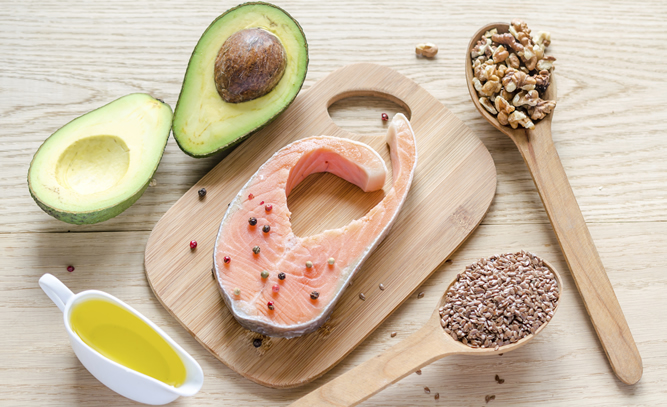Everything you need to know about fats

So why has all this controversy arisen? Fats tend to all get lumped together in the ‘bad’ category, but there are many types of fats, all with different properties. All fats contain the same amount of calories, yet some are healthy, some not so. Fats can roughly be broken down into two categories:
- Unsaturated fat, including monounsaturated fats and polyunsaturated fat – these are usually liquid at room temperature, and usually come from vegetable oils, nuts and seeds. Unsaturated fats play a number of beneficial roles in health.
- Saturated fat, including trans fat – these are usually solid at room temperature, and usually come from animal sources and processed foods. Saturated fats are usually seen as unhealthy fats.
Monounsaturated fat
Monounsaturated fats are seen as a good type of fat, lowering levels of bad cholesterol and increasing levels of good cholesterol, thus protecting against heart conditions. They also provide essential nutrients to allow cells to work efficiently and are necessary to aid absorption of fat-soluble vitamins, such as vitamins E.
Combined, monounsaturated fats and polyunsaturated fats should make up the majority of your total fat intake. Natural sources of monounsaturated fats include olive oil, avocados and nuts.
Polyunsaturated fat
Polyunsaturated fats are often viewed as a healthy replacement for saturated and trans fat in the diet, and like monounsaturated fats, have a healthy effect on the heart and general well-being when eaten in moderation.
Polyunsaturated fats include Omega-3 and Omega-6 which are essential for regulating blood pressure, controlling blood sugar levels, and increasing levels of good cholesterol while lowering levels of bad cholesterol.
Natural sources of this type of fat include plant based oils, such as soybean and sunflower oil, as well as fatty fish, such as salmon and mackerel. Nuts, seeds and tofu are also good sources of polyunsaturated fats.
Foods high in good fats
Generally speaking, natural food sources contain greater quantities of unsaturated fats (or good fats), than they do bad fats, while the reverse is true of processed foods. Certain food sources are good sources of healthy fats, including:
- Olive, sunflower, sesame, soybean, corn and canola oils
- Avocados
- Nuts, including almonds, hazelnuts, macadamia, peanuts and pecans
- Flaxseed
- Fatty fish, including salmon, trout, mackerel, tuna and sardines
- Tofu
Increasing the amounts of these types of food, and reducing intake of processed foods should help to ensure you are including the right types of food in your diet.
Saturated fat
Saturated fat is found most commonly in fatty meat, butter, cheese and cakes and biscuits. The NHS recommends not consuming more than 30g of saturated fat each day for men, and 20g for women. This is because saturated fats cause raise levels of bad cholesterol in the blood, increasing risk of heart disease.
It is worth remembering, however, that certain foods high in saturated fats, such as plant based oils, including coconut oil and almond oil, contain high levels of saturated fats, but little cholesterol, meaning these are not associated with the same health risks as processed foods.
Trans fat
Trans fats are often seen as the worst type of fat for your health. In fact there are two types of trans fats – naturally occurring trans fat and artificial trans fat (or trans fatty acids). There are not many sources of naturally occurring trans fat, though meat and dairy products may contain very small amounts.
More common, however, are artificial trans fatty acids, which are the product of an industrial process which hardens the fat to make it more solid by adding hydrogen. This means that processed foods and fast foods contain the highest levels of these fats.
The reason that trans fats are so common in processed foods is that they are inexpensive, easy to use and preserve well. However, they are the worst fats for raising levels of bad cholesterol, as well as lowering levels of good cholesterol. This increases risk of heart problems, as well as weight gain and type 2 diabetes.
Delicious recipes for you to try
Try introducing more good fats into your daily diet with these tasty and healthy recipes:
Banana & Avocado Smoothie
Gluten-free Spaghetti with Avocado Sauce
Avocado, Lettuce & Tomato Sandwich
Strawberry & Almond Slices
No-bake Cherry & Almond Snack Bars
Healthy Delicious Pizza with Tofu
Tasty Tofu Kebabs
Marinated Tofu Stir-fry





 Looking for our products in a store near you?
Looking for our products in a store near you?
